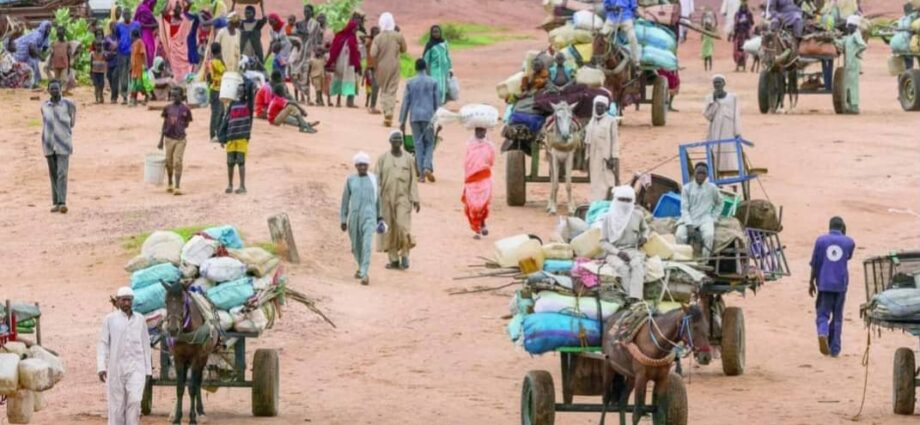Khartoum, Feb 21(Darfur 24
)Local and international warnings have escalated about the hunger catastrophe facing the Sudanese as the war in the country completes its tenth month, with no signs of an immediate solution on the horizon.
Some states of Darfur decided to prevent the transfer of millet crop abroad after the strategic stock of the main crops on which the population depends for food was nearly exhausted.
The United Nations World Food Program has warned of a devastating hunger catastrophe looming on the horizon, with at least 25 million people (about half the population) suffering from high rates of hunger and malnutrition.
Local officials in some displacement camps revealed to Darfur 24 that a number of deaths were recorded due to hunger and malnutrition, especially among children.
In Khartoum, emergency rooms said they recorded a number of deaths as a result of the cessation of the work of charity kitchens due to the cessation of financial transfer applications after communications were cut off for more than two weeks.
The National Umma Party proposed, in a detailed report issued by the party’s Agricultural Committee, the urgent implementation of a tripartite program to cultivate major crops to save the situation, which it described as catastrophic, after the cultivated areas for this year decreased in the regions of Darfur, Kordofan, and Al-Jazira.
The government says that the strategic stock covers people’s needs, but there is difficulty in delivering food to areas controlled by the Rapid Support Forces.
A feminist bloc consisting of 65 organizations launched a campaign against starving Sudanese, directing its appeals to the world. The bloc accused both sides of the war of manipulation and corruption with regard to humanitarian aid to those affected.
Volunteer groups in Khartoum have been complaining for some time; Due to the decline in financial support as the war prolonged, a number of charitable kitchens stopped in the capital, Khartoum, due to the cessation of financial transfer applications after the disruption of communications networks.
Hunger and acute malnutrition rates increased in Sudan after the outbreak of war, as 18 million Sudanese suffer from acute food insecurity while about 3.8 million Sudanese children suffer from malnutrition.
Large areas in the Darfur region are suffering from a severe shortage of food, with the specter of famine looming on the horizon, while the strategic grain reserve in South Darfur has run out, prompting the authorities to prevent the transfer of grains from the state to other states.
The Humanitarian Aid Commissioner in West Darfur State, Abu Al-Qasim Ahmed Ali, revealed in statements to “Darfur 24” last Sunday that 22 children had died in the Morni area, 80 km south of the city of El Geneina, as a result of malnutrition.
Local and international warnings have escalated about the hunger catastrophe facing the Sudanese as the war in the country completes its tenth month, with no signs of an immediate solution on the horizon.
Some states of Darfur decided to prevent the transfer of millet crop abroad after the strategic stock of the main crops on which the population depends for food was nearly exhausted.
The United Nations World Food Program has warned of a devastating hunger catastrophe looming on the horizon, with at least 25 million people (about half the population) suffering from high rates of hunger and malnutrition.
Local officials in some displacement camps revealed to Darfur 24 that a number of deaths were recorded due to hunger and malnutrition, especially among children.
In Khartoum, emergency rooms said they recorded a number of deaths as a result of the cessation of the work of charity kitchens due to the cessation of financial transfer applications after communications were cut off for more than two weeks.
The National Umma Party proposed, in a detailed report issued by the party’s Agricultural Committee, the urgent implementation of a tripartite program to cultivate major crops to save the situation, which it described as catastrophic, after the cultivated areas for this year decreased in the regions of Darfur, Kordofan, and Al-Jazira.
The government says that the strategic stock covers people’s needs, but there is difficulty in delivering food to areas controlled by the Rapid Support Forces.
A feminist bloc consisting of 65 organizations launched a campaign against starving Sudanese, directing its appeals to the world. The bloc accused both sides of the war of manipulation and corruption with regard to humanitarian aid to those affected.
Volunteer groups in Khartoum have been complaining for some time; Due to the decline in financial support as the war prolonged, a number of charitable kitchens stopped in the capital, Khartoum, due to the cessation of financial transfer applications after the disruption of communications networks.
Hunger and acute malnutrition rates increased in Sudan after the outbreak of war, as 18 million Sudanese suffer from acute food insecurity while about 3.8 million Sudanese children suffer from malnutrition.
Large areas in the Darfur region are suffering from a severe shortage of food, with the specter of famine looming on the horizon, while the strategic grain reserve in South Darfur has run out, prompting the authorities to prevent the transfer of grains from the state to other states.
The Humanitarian Aid Commissioner in West Darfur State, Abu Al-Qasim Ahmed Ali, revealed in statements to “Darfur 24” last Sunday that 22 children had died in the Morni area, 80 km south of the city of El Geneina, as a result of malnutrition.

